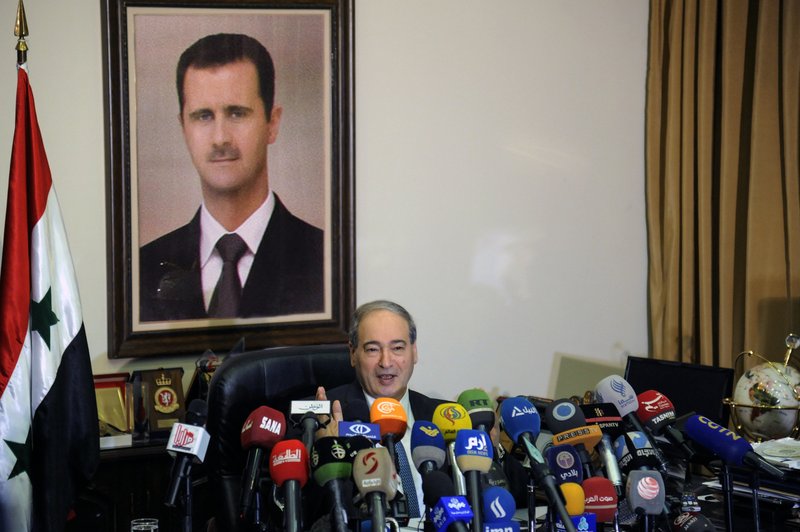The United States is "prepared to act if we must" to stop indiscriminate bombing of civilians in Syria, U.S. ambassador to the United Nations Nikki Haley warned Monday as she circulated a new draft resolution demanding an immediate cease-fire.
Addressing the Security Council 16 days after it passed a resolution demanding a cease-fire that largely has failed to stop the bombing or allow humanitarian access, Haley compared the situation today to last year when the United States launched airstrikes against a Syrian military base after a deadly chemical-weapons attack.
"When the international community consistently fails to act, there are times when states are compelled to take their own action," Haley said.
This is one of those times, she added.
"We warn any nation determined to impose its will through chemical attacks and inhuman suffering, but most especially the outlaw Syrian regime, the United States remains prepared to act if we must," she said. "It is not a path we prefer. But it is a path we have demonstrated we will take, and we are prepared to take again."
French President Emmanuel Macron also threatened targeted strikes in Syria, telling reporters at a news conference in India that France would retaliate if it found "irrefutable evidence" chemical weapons had been used to kill civilians.
Earlier in the Security Council, U.N. Secretary-General Antonio Guterres said the bombing and bloodshed in the Damascus suburbs of eastern Ghouta, a rebel stronghold, had increased since the council called for a cease-fire. Only a limited number of convoys delivering medical supplies and food have succeeded in reaching civilians -- and Syrian government forces confiscated most of the equipment on one load, he said. And not a single critically ill person has been evacuated.
Calling the situation a calamity growing more desperate by the day, Guterres said the Syrian government and its allies -- an oblique reference to Russia and Iran -- had intensified their offensive so much that they have increased the territory they control in the enclave from 10 percent barely a week ago to 60 percent today.
"We have seen nothing but carnage in response to the Security Council's resolution calling for a halt to the massacre in eastern Ghouta," says Arnaud Quemin, the Mercy Corps director of programs in Syria. "Conditions worsen each day. People are fleeing from one shelter to another as the front lines move."
Last month's cease fire was passed with the support of Russia, but only after modifications were made allowing military strikes against "terrorist" groups. The government of Syrian President Bashar Assad takes an expansive view of that designation to include not only al-Qaida and the Islamic State but also rebel opposition groups.
Haley accused Syria, Russia and Iran of using that loophole to bomb hospitals and schools and to "continue starving and pummeling hundreds of thousands of innocent Syrian civilians."
She vowed to close any room for evasion, though it is unclear how it could win the backing of Russia, which has used its veto power to protect the Syrian government in the past.
Syria's U.N. ambassador, Bashar Jaafari, said terrorists had conducted chemical attacks on civilians and staged it to make it look like the Syrian military was to blame. He faulted foreign governments for supporting some rebels.
In Syria, parallel offensives waged by Turkey and the Syrian government on two separate towns on Monday pushed residents into overcrowded shelters for safety as others tried to flee the advancing forces by road.
Residents and displaced families in the besieged town of Douma in eastern Ghouta were sleeping in shops and in the streets as basements in the town filled up beyond capacity, said Haitham Bakkar, a local resident.
Meanwhile, thousands of people were fleeing the northwestern town of Afrin as Turkish troops and Turkey-backed opposition fighters moved closer to encircling it.
Ebrahim Ebrahim, a Europe-based spokesman for the largest Kurdish group in Syria, the Democratic Union Party, said those fleeing were heading toward government-controlled areas, fearful that Turkish troops and Turkey-backed Syrian opposition fighters might commit atrocities against the Kurds and minority Christians, Alawites and Yazidis in the town.
"Water has been cut from Afrin for a week now. Everyone is very scared of what's coming now that the Turkish occupying forces are getting closer to the town's center," said resident Serbest Hassan. He said 800,000 civilians in Afrin were now facing a humanitarian "catastrophe" amid food shortages and relentless Turkish airstrikes. There is real fear, he said, of massacres once Turkish troops and their allies reach the town.
Information for this article was contributed by Bassem Mroue, Philip Issa and Sarah El Deeb of The Associated Press; and by Carol Morello of The Washington Post.
A Section on 03/13/2018
